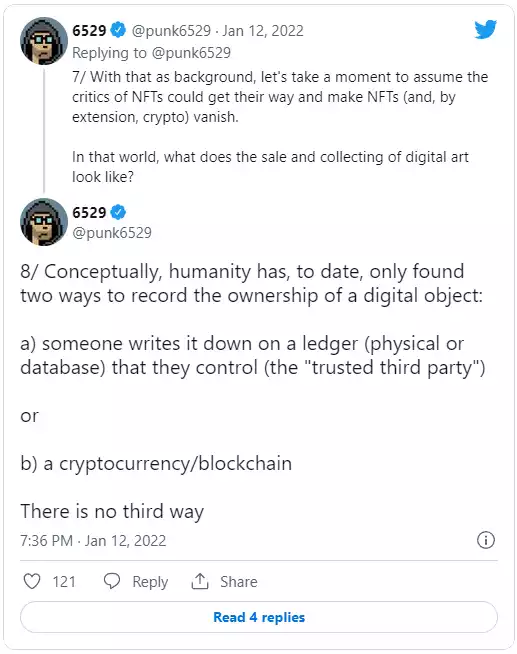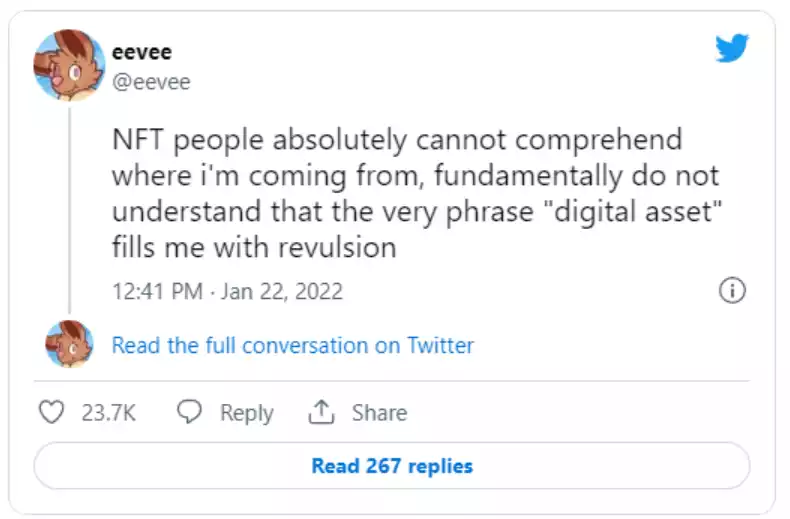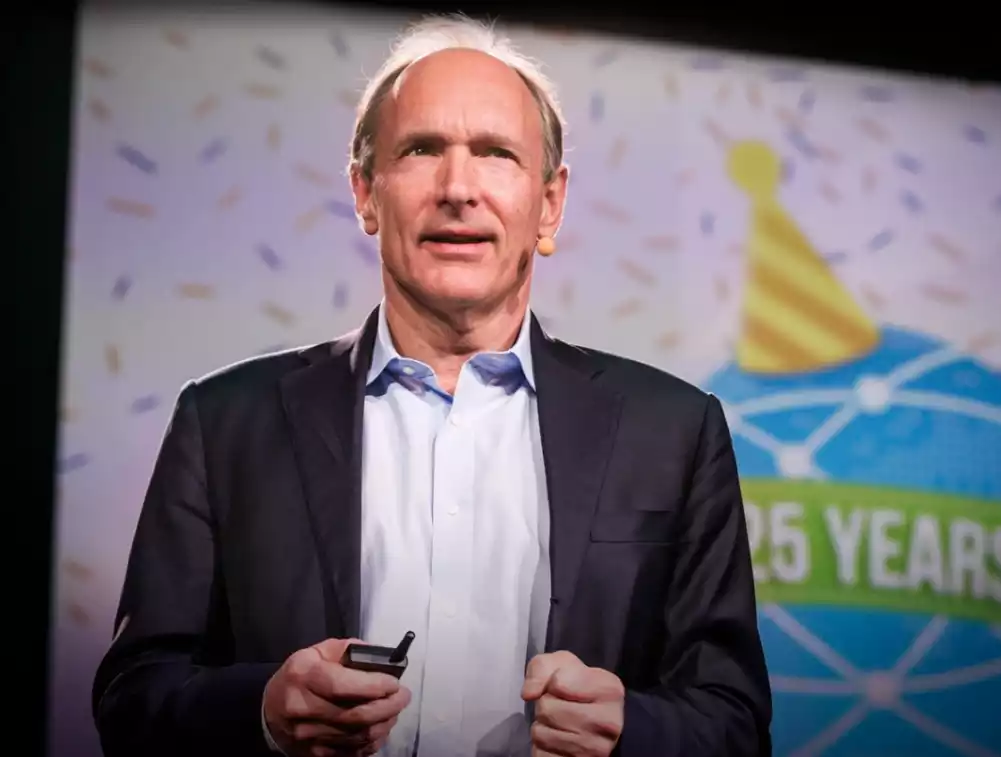Preface: In this article, I will use Web3 to refer generally to communities and projects that support decentralized ownership through blockchain technology, and Web2 to refer generally to communities and projects that are specific to the "normal" part of the Internet, such as Tumblr, Reddit, or Wikipedia.FOSS refers to Free and Open- Source Software. Source Software).
The current argument in favor of Web3 (and NFT in particular) is that Web3 is the only option against predatory centralized ownership systems: you either get a decentralized ownership record on the blockchain via NFT, or Facebook will devour your immortal soul in their horrible centralized database.
@punk6529 gives an example of this position.

Some Web3 critics take a completely different position on this topic, arguing that there is no need for a record of ownership on the Internet, or even for ownership at all. Their argument is as follows: the Internet is not based on property, but on abundance (abundance). Native digital content has the very strange property of being naturally abundant. If you create a GIF or JPEG, you can generate an infinite number of copies and distribute them to everyone. Internet communities thrive on recombining and sharing content for free, and it works very well: emojis, copy-and-paste, webcomics, all emerged because of this. So, if the internet is built on abundance, why would you want to divide up the commons and sell them? Why introduce scarcity? Why introduce property rights? Why are you so greedy?
This brings to mind Rousseau.
"Whoever first encloses a piece of land and thinks to say, 'This is mine,' and finds some simple-minded person who believes him, is the founder of civilized society. If someone pulls down a stake or fills in a ditch and cries out to his kind, 'Do not listen to this liar, but if you forget that the fruit of the land is owned by all and that it belongs to no one, then woe to you!' How many crimes, wars and killings, how much suffering and horror this man would have spared mankind!"
--Rousseau, On the Origin and Foundation of Human Inequality
A recent tweet from Web2 content creator @eevee follows this line of thinking and has garnered extensive engagement from both sides of the debate. In terms of understanding the criticism directed at Web3, this tweet is interesting.

Source of tweets: https://twitter.com/eevee/status/1484748148169793537?s=20&;t=d9VC8f8CISsf002rwQGgmA
The fact is that copyright already exists, and the Internet was never really free. But there is indeed an anarchist or communist-like ethos at the heart of the Internet. We cannot deny the influence of counterculture on the original dream of the Internet. That's where the phrase 'information aspires to be free' comes from.
History tells us that we don't need ownership records, Token incentives, 1COs (first Token issues), or even money, to build compelling projects. Consider the achievements of the free/open source software movement: Linux, Wikipedia are all testament to the legacy of this spirit. The blockchain community can't forget that we created most of the incredible things that run on the internet without ownership or financial records.
If someone were to recreate Wikipedia today, the first comment from a Web3 supporter would be, "Where's the Token incentive? Why should people take the time to write articles? It's not going to work." As it turns out, people like to create things and then distribute them for free. More accurately, a small group of crazy elite super creators make up the majority of content creation on the internet.
So when someone comes over and says "let's create Token incentives, let's create DAOs and build everything", it triggers a subconscious reaction from these Web2 communities: 'It's worked well so far, why would you want to change it? How is this going to make things better?"
This is why I don't necessarily like the definition of Web3 as a blockchain technology paradigm. Web3 is not a necessary strict improvement over what came before, it is not an optimization, it is a choice. web3 is a technical paradigm that can create things that were not possible before (e.g. native digital ownership), but that does not mean that it is strictly superior to or will replace the way things were done in the past.
I like to compare blockchain technology to some kind of 'utopia', an alternate version of history: where ownership exists natively and natively on the Internet. Imagine how different the world would be if we had invented blockchain technology in the 90s.
But the fact that we live in a version of history where ownership doesn't natively exist on the internet is, in retrospect, rather odd. But we had to make do with what we had. That's why we have the 'attention economy', with its ad-based business model and centralized record of ownership. It has its flaws, yes, but we've built a lot of things within those constraints.
I think @eevee's point is a bit naive. Ultimately, (Web2) there are only three ways you can cash in on internet content.
- (try) to enforce copyright: this is where Web3 and FLOSS (free and open source software) agree that this is substandard. Copyright is ubiquitous on the Internet precisely because it is one of the only ways to make money on the Internet, where content is naturally abundant. If you create digital art, there is nothing to stop someone from copying it and selling it, except the threat of copyright infringement and sometimes digital rights management (DRM).
- You can get paid for creating new content: that's what Stallman said in 1984. That's why we have Patreon (a crowdfunding platform for artists), custom artwork (commission art), etc.
- Ads: put an ad on your video, this option is mostly for content creators like YouTubers, not digital artists.
NFT offers a new way to make money: selling digital originals of a piece of content.
NFTs are a way to represent scarcity on the Internet: an NFT is like a digital object that you can sell, just like you would sell a painting. Creating an NFT doesn't require turning off access to content. I see NFT as a new option and a very natural way to make a lot of money on the Internet. That's what the CC0 + NFT movement is trying to achieve: release a work of art in the public domain, allow anyone to reuse, mashup and copy it at will, and record ownership on the blockchain to be able to monetize (monetize) it. (Editor's note: The CC0 protocol indicates that the author contributes the work to the public domain, giving up all copyright. In general, material that complies with the CC0 protocol can be used, processed, or edited deductively without restriction and without infringement.)
The NFT series actually follows different IP strategies, and content creators are free to choose the one that suits their needs. For example.
- No rights granted to NFT holders: buying Cryptopunk (crypto-punk) or Cryptokitty (crypto-cat) does not grant you any rights to the intellectual property, which belongs to the parent company.
- Grants some rights to NFT holders: buying a Bored Ape (Boring Ape) actually grants you the right to mint derivatives and make money from them.
- No rights are granted to anyone (CC0): buying Noun or CrypToadz does not grant you any rights, as their IP (intellectual property) is in the public domain.
You can continue to create content as you did before. You now also have the option to create NFT to sell it. This is not antithetical. If you sell your art prints, you can also sell NFTs.
To give a concrete example, Tim Berners-Lee invented the World Wide Web, released it to everyone for reuse, and successfully auctioned the source code for the Web for over $5.4 million in NFT. As Berners-Lee said in an interview with the Guardian.
"It's completely in line with the values of the web. The question I get is, they say, 'Oh, that doesn't sound like a free and open web.' Well, but the web is as free and open as it's ever been. the core code and protocols on the web are royalty-free, just like they've always been. I'm not selling the web - you don't have to pay to click on a link. What I'm selling isn't even its source code. What I'm selling is an image I made with a Python program I wrote, as if its source code had been posted on a wall and signed by me. If they don't think it's appropriate for me to sell a poster of NFT, what if I buy a book? I'll do something like that, where there's money involved, but the free and open web is still free and open.
--Source: The Guardian

Tim Berners-Lee, inventor of the World Wide Web
There is no fundamental difference between Tokenized communities like Friends With Benefits (FWB) and Patreon. I would argue that Token-controlled communities offer more control to content creators and fans than Patreon because they are not censored by a central authority. As pornography comes under increasing scrutiny on social networks, Web3 offers a viable alternative for some communities.
In the end, I believe there is room for both frameworks in their own way. Just like video imaging didn't really kill radio broadcasting (anyone like listening to podcasts?) ), Web3 won't kill Web2 either.
Digital ownership does not kill abundance.
"Utopia is the framework of various utopias where people can freely and voluntarily join together to pursue and attempt to realize their own visions of a good life in an ideal society, but no one can impose their utopian visions on others."
-- Robert Nozick, Anarchy, State and Utopia
As web3 evangelist @damedoteth says, when you hear critics of blockchain say 'we don't need blockchain', try to understand where their point of view stands, rather than building a straw man argument that they must be advocating total luxury datacenterization. They may be saying, "We've built so many things without blockchain, I don't see what it can bring."
They could be saying that Web3 needs to prove everything compared to Web2.
And they're probably right.
So, let's keep building.
* *This article represents the views of the original author and does not constitute any investment advice or recommendation.
Rhythm BlockBeats reminds that according to the document "Risk Alert on Preventing Illegal Fund Raising in the Name of "Virtual Currency" "Blockchain" issued by the CBRC and other five departments in August 2018, the general public is invited to look at blockchain rationally, not to blindly believe in smallpox promises, to establish the correct concept of currency and investment, and to effectively raise their awareness of risks; to the illegal crimes found clues, you can actively report and reflect them to the relevant departments.